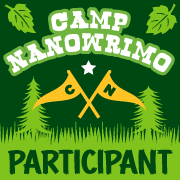 If you need a reason to start and finish that great unwritten novel, look no further: National Novel Writing Month is almost upon us. Between November 1 and 11:59:59 on November 30, all you have to do is release 50,000 words in a known human language that, read sequentially, constitute some kind of narrative.
If you need a reason to start and finish that great unwritten novel, look no further: National Novel Writing Month is almost upon us. Between November 1 and 11:59:59 on November 30, all you have to do is release 50,000 words in a known human language that, read sequentially, constitute some kind of narrative.
Shush the heckling crowd of critics who have colonized your cerebral cortex. Shut the door on the chill winds of self-doubt. Even if all your previous efforts have ended up in second-degree arson trash-can fires, the “NaNoWriMo” concept—the secure knowledge that lots of other folks are suffering in writing heck along with you—provides a poignant sense of Schadenfreude that you can psychically reconfigure as “inspiration.” Plus, their simple and easy rules will help you get to the finish line. Repeat after me: write 50,000 words in one month.
If 50,000 words in one month is too contrived or compressed for you, other writing contests might provide the impetus you’re looking for. The Maryland Writers’ Association has an annual contest—and lots of related resources on their website. Are scorn and derision what you really need to get started? Check out past winners of the International Imitation Hemingway Competition, aka “the Bad Hemingway Contest.” This particular contest seems to be on hiatus, a fact that can generate more writerly angst if you need it.
And what if any kind of contest strikes you as crass, artificial, insufficiently post-modern or [fill in your favorite excuse here]? Then remember your dear old library—great books galore! These can be useful for all kinds of writing tricks: abnegating your own style in favor of abject emulation; reinstating the chill winds of self-doubt, mentioned above, if you work best from a premise of insecurity; deferring your project indefinitely; balancing your laptop on a stack of prize winners that haven’t circulated in decades. For a little light reading, check out the McNaughton Collection on M-level. For More Serious Stuff, browse the call numbers listed on the Writing Seminars guide, under “finding fiction.” To survey your options before investing in a read, look for book reviews in the English + American Literature guide, under “online resources.” Rev your engines, gentle readers, and then write.

Dear Gabrielle Dean,
This is the funniest post I’ve read in ages, though your fellow bloggers are nothing to sneeze at. Thank you for all these wonderful resources and a morning laugh!